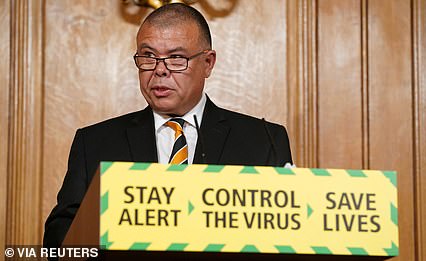Coronavirus deaths hit 24-week low of 73 in final week of August, official data shows – but fatalities from other causes remain above average for third week
- Dip marks a 24 per cent fall on last week’s deaths, the first time they sunk back into double digits
- But deaths in UK remained above the five-year average for a third week running, the official figures revealed
- More than 790 additional deaths were seen in homes and care homes, but remained below average in hospital
- UK’s total coronavirus death toll stands at 57,417 up to August 28, the ONS has said
The number of people dying from coronavirus in the UK fell to a 24-week low in the final week of August, when flu and pneumonia killed more than 10 times as many people, official data has revealed.
A total of 73 people died from Covid-19 in England and Wales in the week ending August 28, according to the Office for National Statistics. The dip marks a 24 per cent drop on the previous week’s 96 deaths, the first time they fell to single figures since the pandemic began.
It is also a nose-dive from the 8,000-plus deaths a week registered at the peak of the pandemic.
But ONS data shows the total number of deaths in the UK has remained above the five-year average for the third week in a row, at 9.6 per cent over the expected level.
More than 790 additional people are dying in private homes and care homes, while deaths in hospitals remain below the average.
Experts argue this is because many patients are still too scared to seek medical treatment for conditions, while others don’t want to ‘burden’ the health service.
Flu accounted for 14 times more deaths than coronavirus in the last week of August, at 1,040. It marks the twelfth week that deaths from influenza have remained above those from coronavirus.
The UK has now registered as many as 57,417 deaths from Covid-19, with 52,316 in England, 4,228 in Scotland and 873 in Northern Ireland.
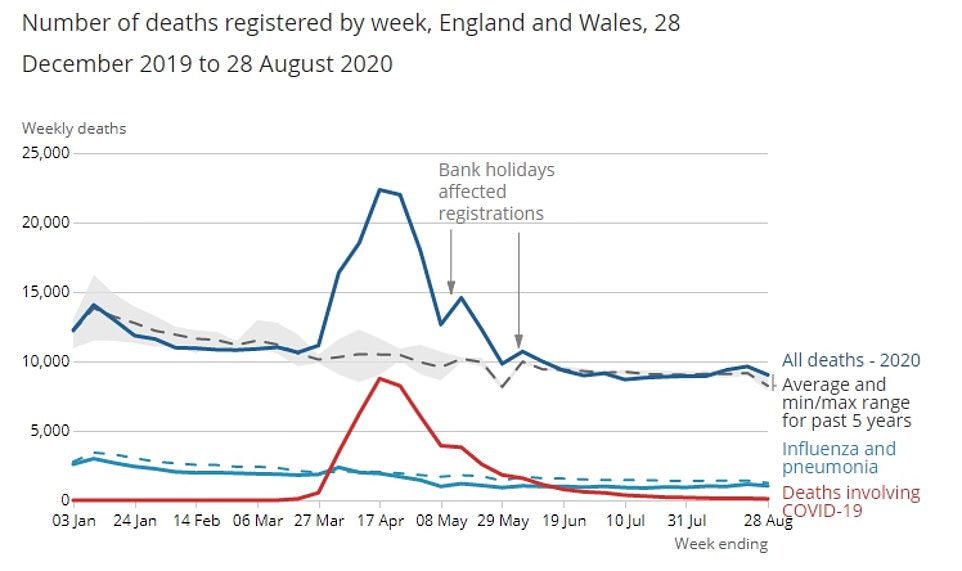
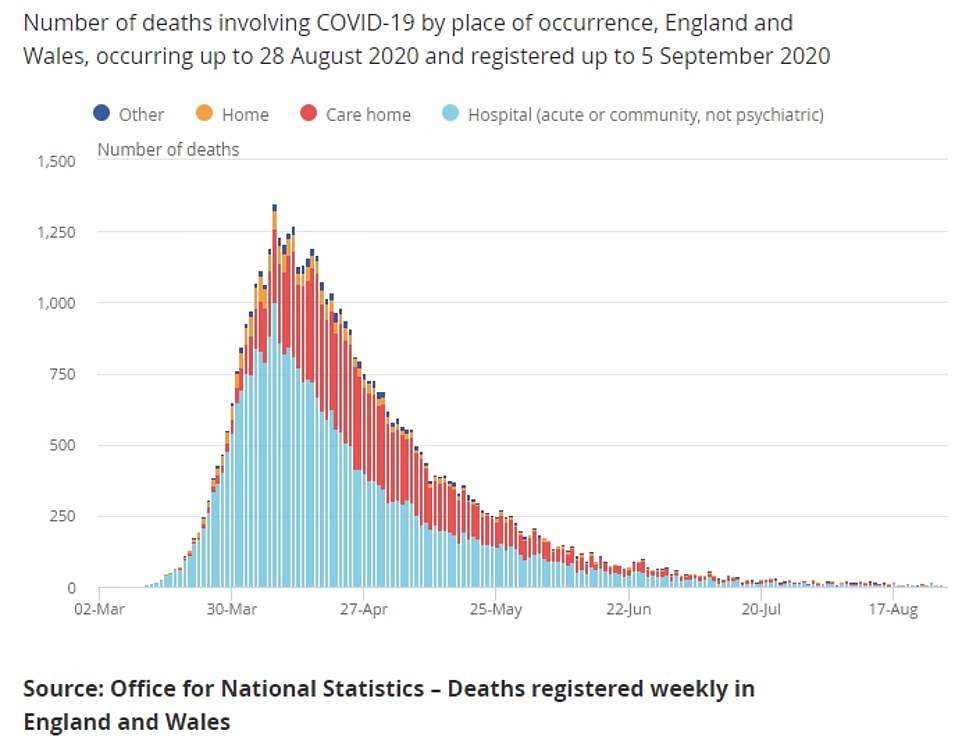
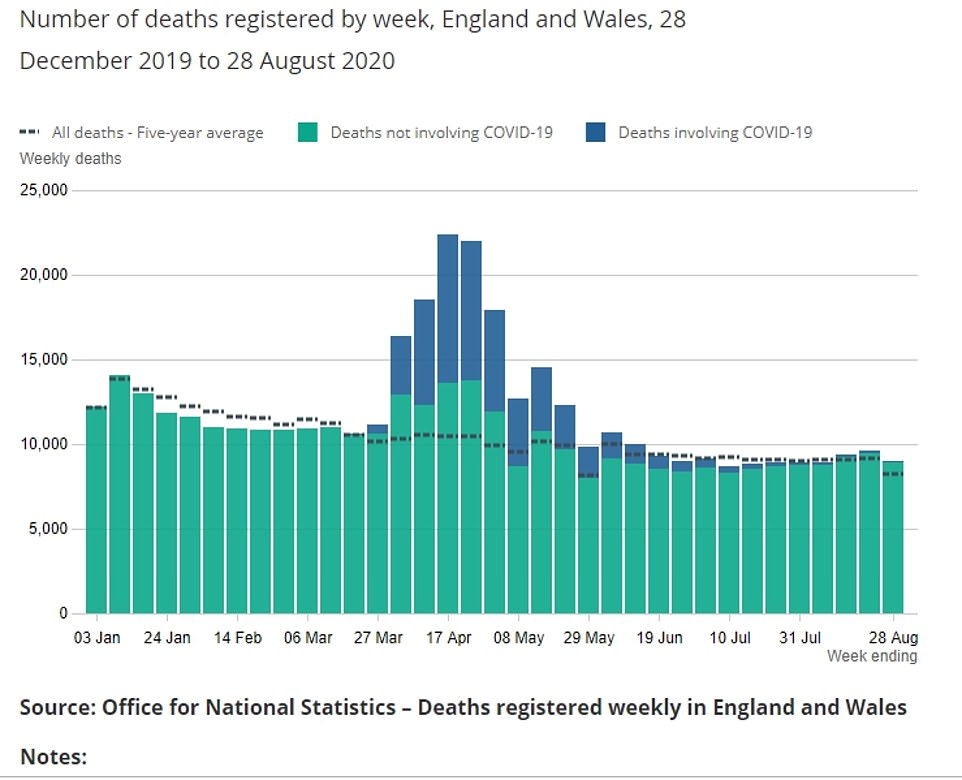
There were a total of 9,032 deaths in the week ending August 28, which is 791 deaths, or 9.6 per cent, above the average.
It is the third week in a row that they have remained above the average, with every region in England and Wales seeing more deaths than expected at this time of year.
The South East suffered the highest volume of excess deaths, with 265 more people dying than statisticians expected, or 21.3 per cent.
Conversely the most deaths from coronavirus were registered in the North West, although this area had the smallest number of deaths above the five-year average.
Of all deaths from coronavirus 63.4 per cent were registered in hospital, 29.6 per cent in care homes and 4.7 per cent in private homes.
The ONS said that while coronavirus ‘did not drive’ the increase it ‘has had a large impact on the number of deaths registered over the last few months and is the main reason for deaths increasing above what is expected’.
‘The disease has had a larger impact on those most vulnerable (for example, those who already suffer from a medical condition) and those at older ages,’ they said.
‘Some of these deaths would have likely occurred over the duration of the year but have occurred earlier because of Covid-19.’
Speaking about the ONS report in the House of Commons today, the health secretary said: ‘Today’s ONS figures show that the weekly coronavirus deaths have dropped to the lowest number since mid-March.
‘However, Mr Speaker, we have seen a concerning rise in the number of positive cases among young people. These serve as a salutatory reminder that this virus is still very much with us and remains a threat.
‘So it is important that we maintain our commitment to controlling this disease. While young people are less likely to die, be in no doubt they are still at risk.’
Figures published today by the ONS showed that 52,316 deaths involving Covid-19 had occurred in England and Wales up to August 28.
National Records for Scotland said 4,228 deaths from the virus had occurred in the country up to August 28, while the Northern Ireland Statistics and Research Agency said they had suffered 873 deaths from Covid-19 up to August 28.
In the final week of August the UK did not register above 1,600 coronavirus cases a day, with a high of 1,522 recorded on August 27.
The final week of August lies just before the August bank holiday, where it is feared the virus began to spread again as Britons ‘relaxed too much’ and enjoyed the last rays of the summer.
Daily coronavirus cases registered in the UK have almost hit 3,000 for two consecutive days, prompting warnings that the rise is ‘concerning’.
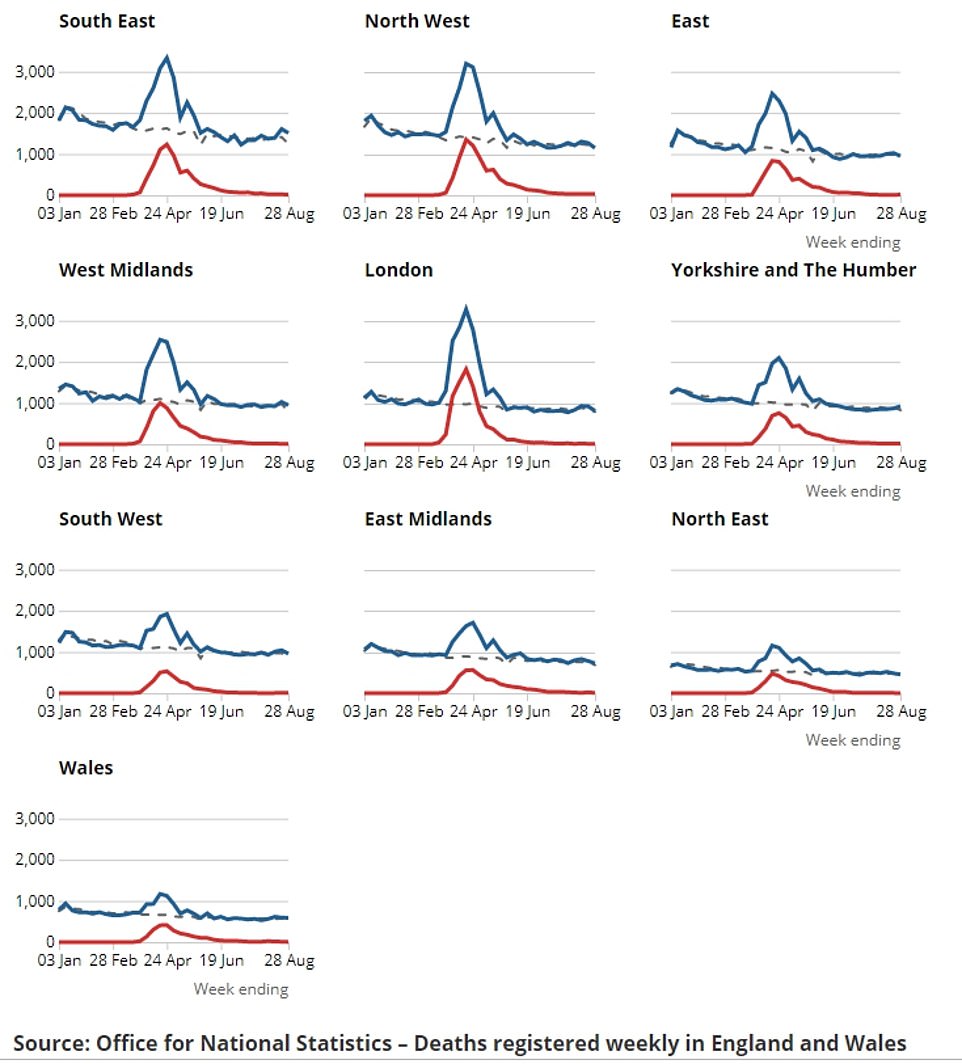
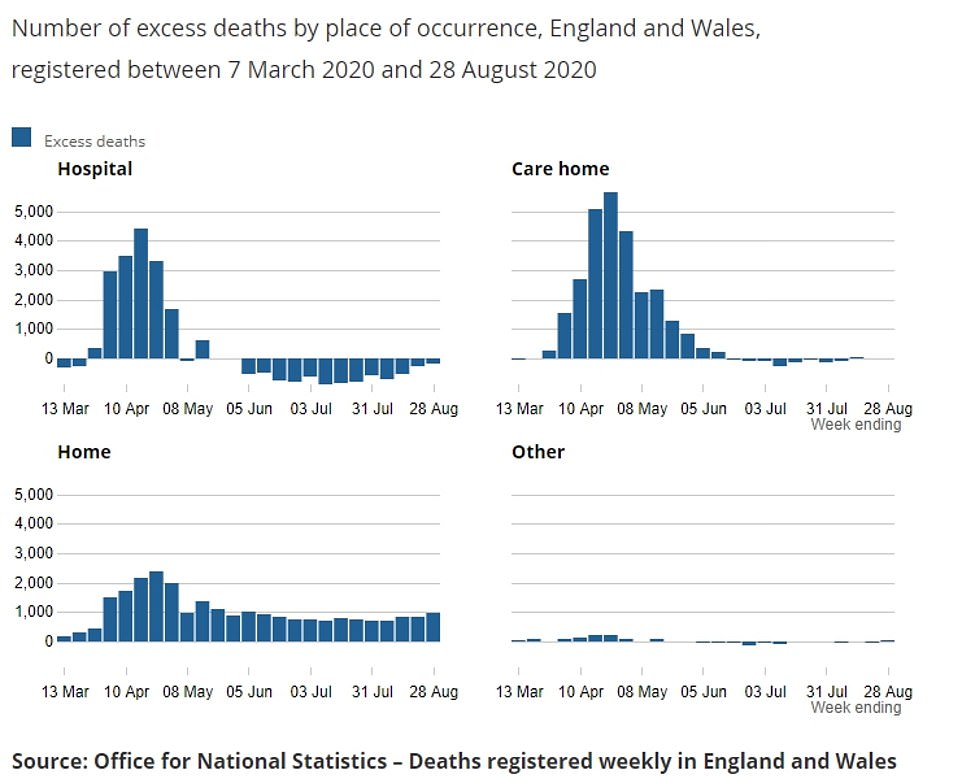
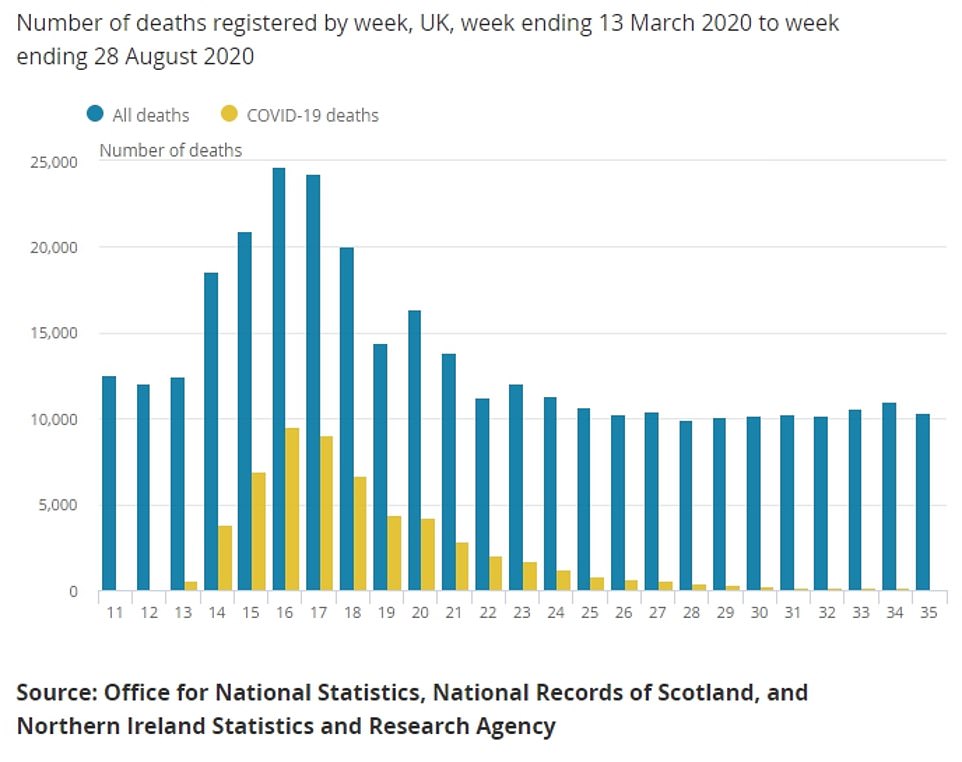
It can take up to a week for coronavirus tests to be processed and have their results reported, meaning the rise may have actually happened around a week ago.
Paul Hunter, associate professor at the University of East Anglia, told MailOnline he expects the death rate may also start going up ‘within the next two weeks’.
An increased rate of new infections may overwhelm the UK’s track and trace system, which would force authorities to re-impose some lockdown restrictions.
Today pubs and bars in Bolton became the first in the country to be ordered to close due to coronavirus.
Matt Hancock said the northern town was now suffering from the highest number of Covid-19 cases in the UK, as many as 160 per 100,000.
Announcing a slew of new measures to control the virus he ordered all hospitality businesses to revert to offering takeout only, and said they could only open between 5am and 10pm. He also warned the government would make it illegal to socialise in someone else’s home, adding further weight to measures already in force.
He said: ‘I want us to learn the lessons from Spain and France, and take this action locally in Bolton. I know how anxious it can be and I know the impact these measures will have.
‘We’re asking you to take a step back at a time when we all just want to get on with our lives. As we’ve seen elsewhere, if we act early and control the virus then we can save lives.’
Explaining the need to take further action, he said: ‘If we were to wait until we saw the number of deaths rising before we took action, then there would already be many many people who had caught the disease, who would end up hospitalised, who would unfortunately die of coronavirus.
‘You have to act before that happens and before that disease spreads to those that will die from it because the alternative is that we will see the number of deaths rise inevitably.’
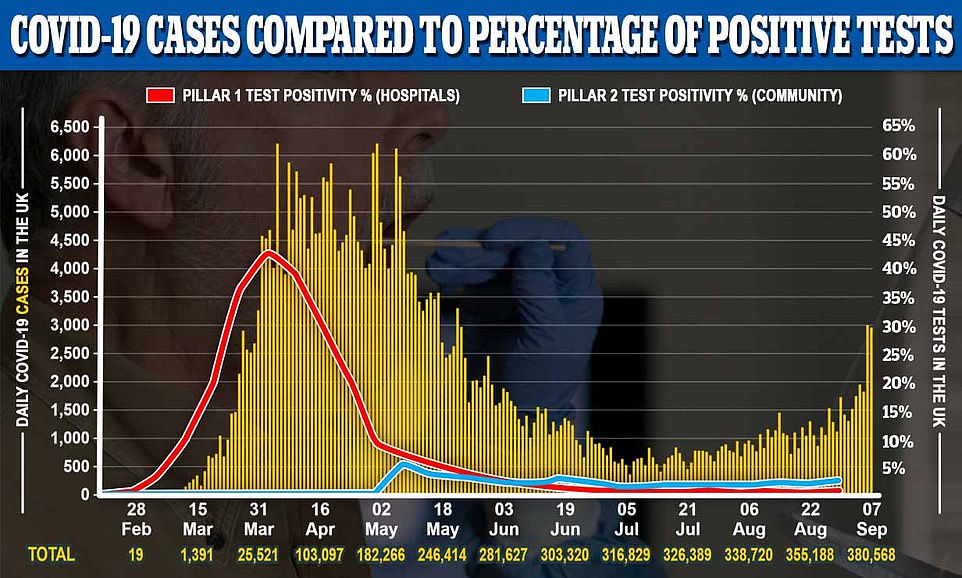
Data from Public Health England shows that more than 40 per cent of coronavirus tests done in hospitals were positive in March and April but this has now plummeted and remains below 2.5 per cent in both hospitals and the community. This shows that there remains only a small proportion of people with the symptoms of coronavirus who actually have it
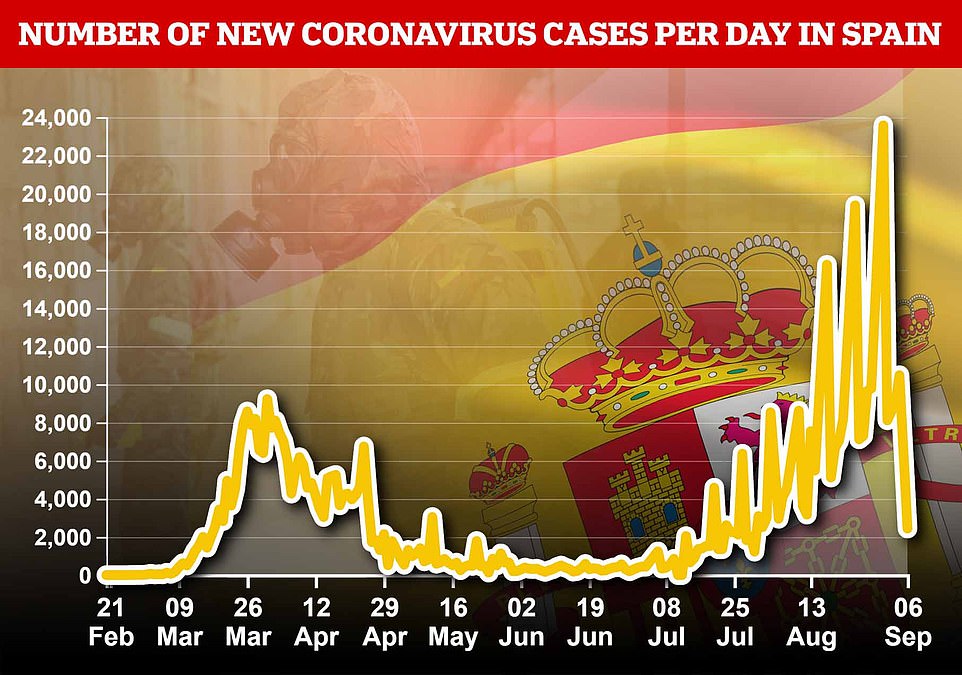
The action comes amid mounting concern that the UK may be heading down the same path as Spain and France, which are now recording rises in deaths and hospitalisations at least four weeks after their cases started to spike.
Spain has seen the number of hospitalisations increase tenfold since mid-July, to 1,829, and seen the number of patients in ICU rise thirteenfold, to 161.
Yesterday it became the first European country to record more than half a million coronavirus cases, as more than 10,000 were added to its worrying total.
The country’s death rate has also begun to edge up, six weeks after the number of cases recorded first nudged above 2,000.
France is also beginning to see a steady rise in the number of deaths, as they record 25 on September 7. Cases rose above 2,000 in the country four weeks ago. Yesterday, 4,203 were recorded in the country.

